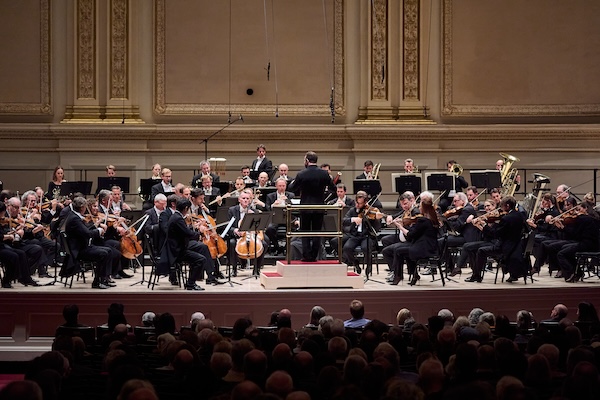Berlin Philharmonic nearly reaches the summit in Bruckner’s Fifth

There was a single flaw in the Berlin Philharmonic’s performance of Anton Bruckner’s Symphony No. 5 Monday night in Carnegie Hall.
The second movement, one of Buckner’s splendid Adagios, had a pace that might have been a fraction fast under chief conductor Kirill Petrenko—the marking is “Sehr langsam,” “very slowly,” and this was just less than “very.” The music flowed with ease, grace and care, and objectively this was in no way bad. It sounded marvelous, and one relished the passing flow. In the context of this performance, though, it made the difference between the tremendous and the extraordinary.
Bruckner’s Fifth is one of his greatest symphonies, and his most important. Never modified once finished, it’s the moment when the composer (whose bicentennial was September 4) eschews his previous Wagnerism and establishes his own distinct voice in the clearest demonstration of his compositional method. Bruckner’s musical logic is idiosyncratic in the classical tradition, and not always transparent, but in Symphony No. 5 the direction and process of the music is beautifully presented, as inexorable and satisfying as the finest narrative.
Petrenko and the orchestra laid this out with superb artistry and expressive, physical energy. With this great orchestra obviously well prepared, Petrenko’s tasks on the podium were the basics: managing tempos, balances, and dynamics. One piece of evidence for the quality of this performance was how thrilling crescendos were. The recapitulation of the opening fanfare in the first movement brings with it some powerful dynamics, and Monday night these had a sense of force that seemed to rise out of the earth, a feeling of mass that was close to the loudest doom metal.
Balances were also exceptional. There is a special Bruckner sound, with his orchestration following what he himself heard playing the organ—a balance between the emulsification of instrumental timbres and occasional, invigorating harshness when the volume came close to overwhelming the pipes. The Berlin Philharmonic had this, with lines colored by strings and winds, a great body of sound from the brass, and explosive chords in the great climaxes. There was a near hysteria in the most intense moments of the Scherzo that was stunning. As with the dynamics, the sheer sound was packed with emotional expression and rewards.
These details were on top of a fantastic overall pace. Instrumental details are compelling but meaningful only if they fit into the overall structure and direction. Monday night, the music unfolded like a blueprint being filled out in real time, with a very modern experience of enjoying the satisfaction of each note falling into place while anticipating the next, something familiar from minimalist music. Giving such life and clarity to the score made the Finale more dramatic than one has ever heard it.
And it was in this context that the Adagio, fluid and gorgeous as it was, didn’t spell out the lines and angles and joints of this blueprint with the same degree of exactitude and fullness as the other movements. The power of this movement comes from its architecture. It is slow because it takes longer to build an arch that it does a path or wall—and compared to the other movements, this was just a bit too straight. If, because of that one detail, this wasn’t quite a life-changing event, it was still an exemplary performance.
Kirill Petrenko and the Berlin Philharmonic perform Rachmaninoff and Dvořák with Vilde Frang as soloist in Korngold’s Violin Concerto 8 p.m. Tuesday. carnegiehall.org
Posted Nov 20, 2024 at 9:47 am by Zack
Disagree, there was not a single flaw in a perfectly sublime performance of Bruckner 5.
As Jochum had said, the first three movements are a vast preparation for the fourth movement with it grand Finale, “more dramatic than one has ever heard it”.
The Adagio was at a perfect pace as a building block in this extraordinary, tremendous performance by the BPO and maestro Petrenko.
Posted Nov 24, 2024 at 6:36 pm by Simon Jones
I think if one compares the Carnegie Hall performance with the season opener in Berlin, the Berlin was noticeably a tauter, finer-boned iteration of the same reading… and I agree, the adagio was a tad urgent. But that’s the revolutionary quality of Petrenko’s musicianship: its sheer vitality, its attack.